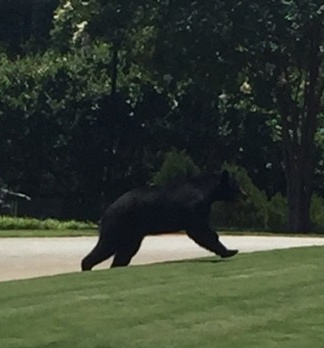As Brad Bechtold and Sam Tisdale were driving back from lunch near the Cherrydale Alumni House on July 20, they managed to capture video footage of a massive black bear running quickly across the exposed lawn and disappear within a dark patch of landscape nearby. The two Herring Center colleagues followed the bear in their vehicle along the roundabout as they recorded a video that would make the incident go viral on Facebook.
Even before this account, other first-hand sightings had been reported to Furman police, starting in late May. Chief of Police John Milby said officers were sent to investigate seven reports this past summer, which explains the string of warning texts sent out between June 29 and July 24.
For those who spent their summer off-campus, the Internet hype might have led some to believe that the bears were sneaking on to Furman grounds as a result of the quieter atmosphere.
Milby explains wildlife biologist Tammy Wactor’s insights made during a lecture hosted in August. As an expert with the South Carolina Department of Natural Resources, Wactor unveiled surprising information about black bear behavior at this time of year.
“Furman is in bear country,” Milby summarizes, “they’re not living or feeding on campus, they’re just passing through for water or for food.” Wactor’s opinion speculates that the bears’ normal wild berry diet has been altered ever since the late frost last spring. With the shortage of wild berries, the black bears came to Furman looking for alternatives like bird seed and pet food.
According to Wactor, black bears display skittish behavior when they come into contact with people, as evidenced by the bear who fled from Bechtold’s moving vehicle. “They’re lovers, not fighters,” Milby continues.
Still, as the black bears use the Furman campus as a point of passage for wayfaring between the Reedy River water source and their forest habitat in Marietta, biologists battle with suburban residents who prefer to keep bird feeders in their yards.
Black bears are looking for sunflower seeds in bird seed while their wild berries are temporarily unavailable.
Should another sighting occur, Milby urges the campus community to call 864-294-2111, whereby a Furman officer will be able to respond promptly.
When an alert is sent out via SMS, temptation and curiosity tend to make people go out and look for bears, but if it climbs a tree, it is more difficult to escort the bear off campus, Milby said. Bechtold also estimated that the bear he witnessed was over 300 pounds and over 6 feet tall: “Unfortunately, the video doesn't quite reflect his size. It's like the side mirrors on your car which says "objects are often closer than they appear."
Everyone is reminded to exercise caution despite the gentle nature typical of black bears.

